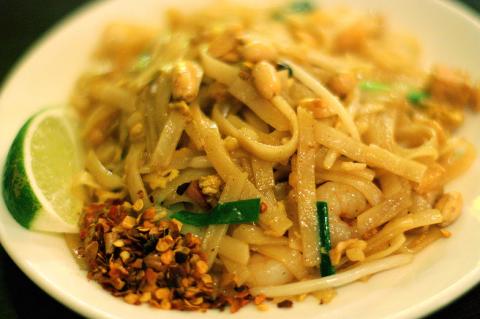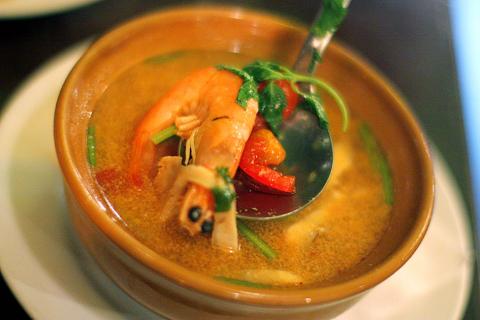Located near Zhongxiao Dunhua MRT Station (忠孝敦化捷運站), Lacuz Thai Fusion Cuisine offers an enticing proposition — Thai food that costs just NT$450 to order an all-you-can-eat selection from 65 options. (You can also pay NT$390 to select from a 38 item menu.) The array of dishes offered is extremely broad and the quality varies widely, but when the food is good, it is very good.
At Lacuz, you order from a menu instead of serving yourself from a buffet, which prevents the chaotic crowds and feeding trough atmosphere seen at many all-you-can-eat restaurants while allowing you to choose the spiciness of your dishes. The restaurant’s busy servers are attentive once you flag them down, but the best thing to do is to get as many dishes as possible in your first round of ordering; otherwise, you might be in for a long wait. Each plate is very small, which allows you to sample many flavors without leaving uncomfortably bloated.
First off, the dishes you can skip to save space in your stomach for worthier options. The pineapple fried rice could not decide if it wanted to be an entree or dessert. In addition to chunks of the fruit and the cashew nuts usually found in the dish, Lacuz’s version also included a lot of raisins and very sweet rousong (肉鬆), or dried pork floss. All it needed was some coconut milk to turn it into a pudding.

Photo: Catherine Shu, Taipei Times
(Raisins seem to be a signature Lacuz vice. On a recent visit to Lacuz’s sit-down restaurant in the Bellavita shopping mall, my friend and I also had to pick tonnes of the dried fruit out of an otherwise excellent fried rice).
The best part of the deep-fried shrimp cake was its sweet and sour dipping sauce. The shrimp cake itself was not served hot and did not taste freshly made. Our deep-fried chicken in curry sauce was fine, but the curry was bland and not spicy at all.
Lacuz’s must-order dishes include the steamed sea bass, which was served whole on a small chaffing dish. Cooked in a fantastic lime and garlic sauce, the mellow-tasting meat was tender and easy to slip off the bone. The deep-fried shrimp rolls are served in a few tiny pieces to an order, but they are so packed with flavor in their crispy skins that just a few bites is enough.

Photo: Catherine Shu, Taipei Times
The small portion of papaya salad was a refreshing counterpoint to our more flavorful, oilier entrees, while our other cold dishes, like the century egg salad (just a couple of slices of egg topped with a sweet and sour sauce) and raw prawns with chopped raw garlic and chili, were also good.
Lacuz’s pad Thai (called stir-fried kway tewo Thai style on the restaurant’s English menu) is plated in an unappealing lump, but the firm rice noodles were the right texture and the lime juice and chili sauce were delicious. A refreshing tom yum shrimp soup was a good final dish and our dessert, included in the all-you-can-eat price, was a little bowl of black pudding rice with coconut milk.
The reason for Lacuz’s 10 percent service charge is a bit of a mystery, considering that the servers only showed up at our table after we vigorously flagged them down. We were served the wrong dish two times during our dinner. On the other hand, all of our small plates arrived quickly and our waiters, when we did see them, were very easygoing as they patiently helped us navigate the huge menu.

Towering high above Taiwan’s capital city at 508 meters, Taipei 101 dominates the skyline. The earthquake-proof skyscraper of steel and glass has captured the imagination of professional rock climber Alex Honnold for more than a decade. Tomorrow morning, he will climb it in his signature free solo style — without ropes or protective equipment. And Netflix will broadcast it — live. The event’s announcement has drawn both excitement and trepidation, as well as some concerns over the ethical implications of attempting such a high-risk endeavor on live broadcast. Many have questioned Honnold’s desire to continues his free-solo climbs now that he’s a

As Taiwan’s second most populous city, Taichung looms large in the electoral map. Taiwanese political commentators describe it — along with neighboring Changhua County — as Taiwan’s “swing states” (搖擺州), which is a curious direct borrowing from American election terminology. In the early post-Martial Law era, Taichung was referred to as a “desert of democracy” because while the Democratic Progressive Party (DPP) was winning elections in the north and south, Taichung remained staunchly loyal to the Chinese Nationalist Party (KMT). That changed over time, but in both Changhua and Taichung, the DPP still suffers from a “one-term curse,” with the

Lines between cop and criminal get murky in Joe Carnahan’s The Rip, a crime thriller set across one foggy Miami night, starring Matt Damon and Ben Affleck. Damon and Affleck, of course, are so closely associated with Boston — most recently they produced the 2024 heist movie The Instigators there — that a detour to South Florida puts them, a little awkwardly, in an entirely different movie landscape. This is Miami Vice territory or Elmore Leonard Land, not Southie or The Town. In The Rip, they play Miami narcotics officers who come upon a cartel stash house that Lt. Dane Dumars (Damon)

Today Taiwanese accept as legitimate government control of many aspects of land use. That legitimacy hides in plain sight the way the system of authoritarian land grabs that favored big firms in the developmentalist era has given way to a government land grab system that favors big developers in the modern democratic era. Articles 142 and 143 of the Republic of China (ROC) Constitution form the basis of that control. They incorporate the thinking of Sun Yat-sen (孫逸仙) in considering the problems of land in China. Article 143 states: “All land within the territory of the Republic of China shall